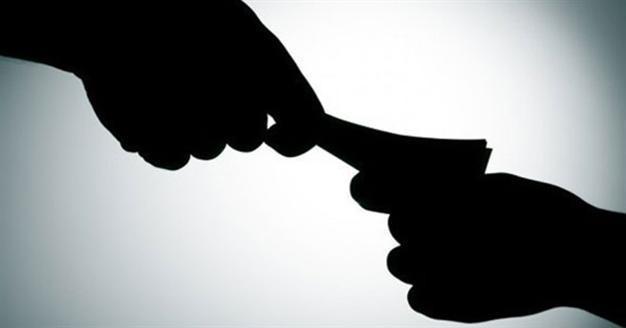Turkey falls in 2015 Corruption Perception Index
ISTANBUL – Doğan News Agency

Turkey’s score in Transparency International’s 2015 Corruption Perceptions Index (CPI) fell by three points from the previous year to 42, making the country one of the index’s worst performers over the past four years, alongside countries such as Libya and Brazil.
This also indicated a two-spot drop in in the rankings compared to last year, placing Turkey in the 66th position among the 168 participating countries, according to the report released on Jan. 27.
Transparency International, one of the leading global civil society organizations in the fight against corruption, has been publishing the index annually since 1995, when Turkey’s score was 41.
According to the data announced by Transparency International Turkey, Turkey’s score fell three points to 42, down from its 2014 score of 45. Turkey also fell from 64th to 66th.
“Having reset the improvement of the previous six years with the drop in 2014, the reported decrease in 2015 means Turkey has sustained its negative status,” said the report.
This decline stemmed from “an adverse and unfavorable deterioration of the reforms that have been reported as improvements during the last few years,” said the index statement.
Turkey moving away from EU
The 2015 CPI also indicated Turkey was “moving away from Europe, as it falls behind the EU states.”
“Alongside Macedonia, which had been shaken by the tape scandals in the previous year, Turkey is tied for third place out of 19 Eastern European and Central Asian states. Among the G-20 member states, Turkey’s rank declined from 10 to 12. Furthermore, Turkey is listed in the index amidst the worst performers of the last four years, including Libya and Brazil, which is being shaken with scandals,” the announcement added.
According to the index data, 68 percent of the 168 countries in the 2015 CPI scored below 50. Denmark was listed as the best performer with a score of 91, while Finland with 90 points and Sweden with 89 points followed respectively.
On the other hand, North Korea and Somalia were the worst performers this year with the highest perception of corruption, both with a score of eight points.
“These results clearly demonstrate the need to develop much more transparent, proper and accountable policies by public institutions and officials,” urged Transparency International.
Lack of judicial process, legal interventions
“The lack of judicial process for corruption scandals and interventions in legal procedures led to the consolidation of an impunity culture and the perception that corrupt actions will not be prosecuted,” Transparency International Turkey chair Oya Özarslan said.
“This brings about a social mood in which learned helplessness, indifference and apathy dominate.
Furthermore, the lack of anti-corruption reforms in recent years, combined with the social mood described above, doesn’t help create the right conditions for the fight against corruption,” she added.
A global response to strict restrictions
The decline could also be interpreted as a “global response to the strict restrictions on the freedom of speech and expression, increasing censorship on the internet and social media, the visible pressure on the judiciary and unlawful exercises in Turkey,” according to Özarslan.
“In the social and political sense, the results of the 2015 index emphasize that the issue of corruption has become a question of freedom of democracy, speech and expression. In this context, Transparency International states that fast growing economies, a categorization Turkey belongs to, have been developing a culture of impunity and calls on them to embrace a ‘culture of transparency,’ which is indispensable for a democratic and accountable society,” she said.
Impact on FDI expected
The international data could have an impact on the amount of foreign direct investments (FDI) Turkey receives, said Özarslan, who urged that “compared to states in strict economic cooperation and/or competition with Turkey, Turkey is in a sustained downturn.”
The Transparency International Turkey chief stressed, “Such a trend could impact national and multinational corporations operating in Turkey directly due to the increased perceived risks. One has to keep in mind that in states where corruption perceptions are high and a culture of transparency doesn’t exist, poor economic growth and high-cost production are unavoidable, thus harming domestic economy and the people.”
Authorities should take solid steps
She underlined the country has been “at a standstill for the last 21 years” according to year-over-year progress. “This demonstrates that corruption and problems with transparency have become deep-rooted issues specific to the public sector and reveals that necessary steps for improvement have not been taken,” she said.
The organization also called on authorities to take “solid steps” needed for progress on the fight against corruption and the issue of transparency.
CPI methodology
The CPI draws on data sources from 12 different studies by 11 international institutions specializing in governance and business climate analysis for 168 countries, and reflects the opinions of experts and businesspeople on corruption in the public sector. The index uses a scale from 0 (perceived to be highly corrupt) to 100 (perceived to be very clean) to rank the countries.
Turkey’s score was identified by the contents and results of eight surveys out of these 12 international surveys. These eight surveys were by the World Economic Forum EOS, Bertelsmann Foundation TI, IMD World Competitiveness Yearbook, Bertelsmann Foundation SGI, World Justice Project ROL, PRS International Country Risk Guide, Economist Intelligence Unit and IHS Global Insight.
 Turkey’s score in Transparency International’s 2015 Corruption Perceptions Index (CPI) fell by three points from the previous year to 42, making the country one of the index’s worst performers over the past four years, alongside countries such as Libya and Brazil.
Turkey’s score in Transparency International’s 2015 Corruption Perceptions Index (CPI) fell by three points from the previous year to 42, making the country one of the index’s worst performers over the past four years, alongside countries such as Libya and Brazil.